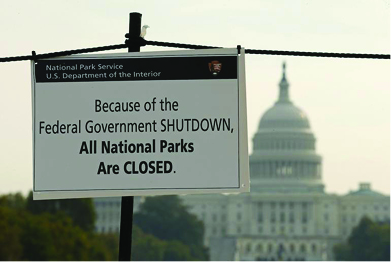THE UNITED States (US) Congress came to terms on a final $1.1 trillion spending deal last January 13, following the 16-day economic shutdown that swept the country in October of last year.
Bipartisan cooperation between Democrats and Republicans paved the way for the new legislation. Known as the omnibus appropriations bill, it is set to guide government spending into 2015. This bill allows for Obama’s signature reforms in healthcare and Wall Street to continue, albeit with less money than he had intended.
With an overwhelming 72-26 vote from the Senate and a 359 to 67 vote from the Congress, politicians were one in their sentiment to prevent another federal government shutdown before spending authority expired on January 15.
“We are pleased to have come to a fair, bipartisan agreement on funding the government for 2014,” Senate Appropriations Chairwoman Barbara Mikulski and House Appropriations Chairman Hal Rogers said in a joint written statement. “Although our differences were many and our deadline short, we were able to a draft a solid piece of legislation that… keeps the government open and eliminates the uncertainty and economic instability of stop-gap governing.”
“Not everyone will like everything in this bill. But in this divided government, a critical bill such as this simply cannot reflect the wants of only one party,” they added.
A happy compromise?
Despite garnering a majority vote, the budget deal is not free of criticism. With its $45 billion expenditure increase, conservative groups, Tea Party activists and the Republican far right denounced the agreement as a shameful return to profligate and irresponsible spending.
“Has Congress learned nothing from the Obamacare disaster?” Jenny Beth Martin, national coordinator of the Tea Party Patriots, said to the New York Times. “We need members in the House and the Senate who are willing to keep their campaign promises, stand up for the people and protect Americans from Washington’s tax, borrow, spend and spend and spend mentality.”
After the political catastrophe of last year’s economic shutdown, however, Republicans were more amenable to the budget’s approval. With a Republican vote of 166 for the bill and 64 against it in Congress, the new budget easily passed into the Democrat-controlled Senate, which gave its resounding approval.
“Government has to function, and we saw the specter of two possible government shutdowns in 2014, one in January and one in October,” Republican 2012 vice presidential nominee and House Budget Committee Chairman Paul Ryan told NBC.
“Getting a budget agreement that reduces the deficit without raising taxes and prevents two government shutdowns from occurring in 2014, in my opinion, is the right thing to do and it’s a good thing to do.”
Obamacare
From October 1 through 16, 2013, the United States Federal Government curtailed most operations after Congress failed to enact legislation to the appropriate funds for fiscal year 2014. Approximately 800,000 federal employees were indefinitely furloughed, and another 1.3 million required to report to work without known payment dates.
The shutdown occurred after Republicans refused to sign the Continuing Appropriations Resolution without Democrat assurances to cut back on, or completely defund, the Patient Protection and Affordable Care Act (commonly known as Obamacare). They raised the issue of unsustainability, arguing that Obamacare would impede key profit-making strategies of the US healthcare sector.
Economics senior Louis de Jesus finds fault with the Republican’s logic as regards their stance on the matter. “When Obama proposed what essentially was ‘Romneycare,’ the Republicans hated it, especially the conservative base, simply because it was supported by Obama,” he said.
Raising the debt limit
Though there is some relief that there will not be another shutdown in the near future, a different risk is potentially next in line.
Congress must decide if there is to be another boost in the $17 trillion federal debt limit. The US is scheduled to reach the debt limit this month.
In the last three months of 2013, the Commerce Department reported a 3.2% growth in the US economy. “Consumers are slowly but steadily increasing their spending, thanks to moderate job and income growth and gains in stock and home prices,” PNC Bank chief economist Stuart Hoffman told The Guardian. “Businesses are boosting their investment thanks to very good profitability, low interest rates and less uncertainty over the economic outlook and government policy.”
Congress raises the limit in order to pay the government’s bills in full and on time, preventing a government shutdown—or worse, a default.
Yet the October 2013 shutdown is entirely different from a possible shutdown that takes place when the debt limit has not been increased. In the latter case, the Treasury will not be allowed to borrow money and will have to exercise prioritization, leaving other government bills delayed.




